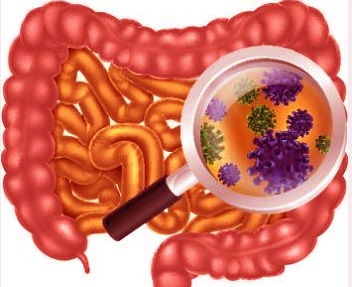Nikhil Prasad Fact checked by:Thailand Medical News Team Dec 08, 2024 4 months, 1 week, 1 day, 14 hours, 19 minutes ago
Medical News: Enteric viruses are a growing concern for public health worldwide, primarily due to their impact on the gastrointestinal (GI) system. These viruses, including rotavirus, norovirus, enterovirus, and even SARS-CoV-2, affect millions annually, causing symptoms ranging from diarrhea and abdominal pain to more severe conditions like encephalitis. Research on these viruses reveals their complex mechanisms of infection and potential systemic effects. This
Medical News report delves into recent findings and emphasizes the importance of continued research.
 Enteric Viruses and Their Effects on Human Health
What Are Enteric Viruses?
Enteric Viruses and Their Effects on Human Health
What Are Enteric Viruses?
Enteric viruses primarily infect the intestinal epithelial cells, which serve as the body's defense against pathogens entering through food or water. These viruses are highly transmissible via the fecal–oral route, often through contaminated food, water, or person-to-person contact. Symptoms of infection typically include vomiting, diarrhea, and abdominal discomfort. However, some enteric viruses can breach the intestinal barrier, spreading to other organs and causing severe complications.
This study and its key findings highlight on how these viruses interact with the human body, particularly focusing on their mechanisms of infection and systemic impacts.
Rotavirus: A Global Threat to Children
Rotavirus (RV) is a major cause of gastroenteritis in children under five years old, responsible for approximately 130,000 deaths annually. It spreads via contaminated food and water, leading to severe diarrhea and dehydration. RV primarily targets the intestinal villi, disrupting their function and causing significant fluid loss.
Research from the Research Center for Emerging Viral Infections and Chang Gung University in Taiwan has shown that RV produces a protein called NSP4, which disrupts calcium homeostasis in cells. This leads to diarrhea by increasing intestinal motility and disrupting fluid absorption. Beyond gastroenteritis, RV has been linked to systemic diseases like type 1 diabetes and neurological disorders, emphasizing its broader impact on health.
Norovirus: A Persistent Winter Threat
Norovirus (NoV) is infamous for its role in acute gastroenteritis outbreaks, especially during winter. It is responsible for about 200,000 deaths annually, particularly affecting children and the elderly. NoV damages the intestinal lining, leading to symptoms such as watery diarrhea and vomiting.
Studies have shown that NoV interacts with histo-blood group antigens (HBGAs) in the gut, facilitating its attachment and replication. Despite its prevalence, research on NoV has been limited due to challenges in culturing the virus in laboratory settings. Recent breakthroughs, such as the use of human intestinal organoids, offer hope for better understanding and combating NoV.
Enteroviruses: Beyond Hand-Foot-and-Mouth Disease
Enteroviruses, including EV-A71 and Coxsackievirus, are well-known
for causing hand-foot-and-mouth disease (HFMD) but can also lead to severe complications like meningitis and encephalitis. EV-A71, for instance, has been linked to neurological damage and pulmonary edema.
Research indicates that EV-A71 uses receptors like SCARB2 and PSGL-1 to infect cells, enabling it to spread to various tissues. Its ability to increase vascular permeability and trigger systemic inflammation highlights its potential for causing widespread damage.
The Emerging Role of SARS-CoV-2 in Enteric Infections
While primarily a respiratory virus, SARS-CoV-2 has been shown to infect intestinal cells, causing GI symptoms like diarrhea and nausea. The virus binds to ACE2 receptors, which are abundant in the gut, facilitating its entry and replication.
Studies have revealed that SARS-CoV-2 infection in the intestine can disrupt the gut barrier, allowing microbes and toxins to enter the bloodstream. This not only exacerbates inflammation but also increases the risk of systemic complications, including cytokine storms.
Pathogenesis and Challenges
Understanding the mechanisms by which enteric viruses infect and damage the intestinal lining is crucial for developing effective treatments. For instance, RV's NSP4 protein acts as an enterotoxin, while NoV's structural proteins increase intestinal permeability. Similarly, SARS-CoV-2's ability to downregulate ACE2 affects the gut's anti-inflammatory capabilities, leading to severe outcomes.
The challenges in studying these viruses often stem from the lack of appropriate models. For example, the inability to culture NoV in vitro has hindered progress in understanding its behavior and developing vaccines.
Conclusions
The fight against enteric viruses requires a multifaceted approach, combining improved hygiene practices, vaccination, and targeted treatments. Vaccines for viruses like RV and EV-A71 have significantly reduced disease burden, but challenges remain. For example, the global coverage of the RV vaccine is only about 50%, leaving many children vulnerable.
Further research is needed to understand the unique mechanisms of each virus and develop effective interventions. This includes exploring new infection models and investigating the systemic effects of these viruses. The insights gained will be critical in preventing outbreaks and improving global health outcomes.
The study findings were published in the peer-reviewed journal: Biomedicines.
https://www.mdpi.com/2227-9059/12/12/2773
For the latest on Enteric Viruses, keep on logging to Thailand
Medical News.
Read Also:
https://www.thailandmedical.news/news/understanding-how-gut-viruses-affect-the-brain
https://www.thailandmedical.news/news/scientists-identify-ten-different-viruses-including-emerging-viruses-causing-gastroenteritis-in-children-during-and-after-the-covid-19-pandemic
